|
|
|
Sort Order |
|
|
|
Items / Page
|
|
|
|
|
|
|
| Srl | Item |
| 1 |
ID:
146511
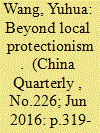

|
|
|
|
|
| Summary/Abstract |
This article presents a large-scale, systematic study of politically connected firms in China. It was conducted by compiling a database of all the publicly traded firms in China in 1993, 2002 and 2012 that codes the biographies of hundreds of thousands of board members. I find that there has been a significant increase in the percentage of firms that are connected with the national government in the last 20 years. This casts doubt on a popular argument that businesses in China have primarily relied on “local protectionism.” I interpret this as a result of firms' need to connect with powerful and stable institutions. I test this by examining the impact of the fall of Chen Liangyu on firms in Shanghai.
|
|
|
|
|
|
|
|
|
|
|
|
|
|
|
|
| 2 |
ID:
153318
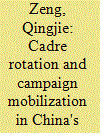

|
|
|
|
|
| Summary/Abstract |
In authoritarian regimes, anticorruption measures are fundamentally mechanisms of controlling agents at various levels. To do this, the principal can either rely on routine bureaucratic management or resort to ad hoc, intense mobilization to discipline its agents. Using China as a case study, this article explores which mode of top-down control exerts greater influence on the pattern of anticorruption enforcement. We focus on the cadre rotation system as an example of routine management techniques and examine its effects on provincial level enforcement. We also investigate how provinces respond to the central government's periodic call to intensify anticorruption efforts. Based on provincial enforcement data from 1998 to 2013, our analysis finds that the proportion of rotated officials has little impact on enforcement outcomes. Rather, the vigor of enforcement in the provinces responds strongly to national policy priorities, suggesting a highly centralized disciplinary system. Moreover, provinces of greater political importance are under more central pressure to conform. The findings challenge the often-made argument that stable institutions are effective in fostering top-down control in authoritarian regimes, and suggest that campaign mobilization continues to be an essential instrument at the dictator's disposal.
|
|
|
|
|
|
|
|
|
|
|
|
|
|
|
|
| 3 |
ID:
189976
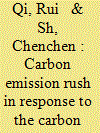

|
|
|
|
|
| Summary/Abstract |
China has announced ambitious dual-carbon targets to peak carbon emissions by 2030 and achieve carbon neutrality by 2060. However, due to regional differences and lack of accurate emission monitoring data, local governments have been given greater autonomy to achieve these targets. Based on semi-structured interviews and document analysis on emission peak campaigns in inland regions, this article identifies one local game strategy – ‘Dauling Dragon’ (木翼双龙) whereby local governments prioritize high emission projects to be completed by 2030 in order to create a margin for future development, a phenomenon known as ‘carbon rush’ (碳冲锋). The article explores the consequences and antecedents of such a strategy through the lens of environmental authoritarianism. It also makes a theoretical contribution to the conceptualization of the Dauling Dragon strategy, by focusing on its effects on local environmental implementation. Findings from our case study show that China’s climate ambitions, especially its long-term carbon neutrality goal, faces local political obstacles.
|
|
|
|
|
|
|
|
|
|
|
|
|
|
|
|
| 4 |
ID:
179292
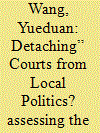

|
|
|
|
|
| Summary/Abstract |
The local party-state has always been a major source of extrajudicial influence in China. Drawing on interviews with judges, this article examines the impact of Xi Jinping's ambitious judicial centralization reforms, which are aimed at enhancing judicial autonomy by transferring authority over local court personnel and finances from local to provincial level. It finds that the reforms have achieved limited results. Although many appointment and budgetary powers were formally transferred to the provincial level, the local party-state retains considerable influence in both areas owing to its superior manpower, local knowledge and, in the case of developed regions, financial resources. Moreover, the local party-state maintains significant informal influence over the courts, which require many forms of discretionary assistance from various state organs – ranging from appropriating land for new courthouses to providing police protection for remote tribunals – in order to function. This setback highlights the depth and complexity of the courts’ political and economic embeddedness and serves as a reminder of the inherent difficulty of institutionalizing judicial autonomy, however limited, in a large and diverse party-state.
|
|
|
|
|
|
|
|
|
|
|
|
|
|
|
|
| 5 |
ID:
141098
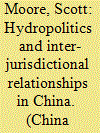

|
|
|
|
|
| Summary/Abstract |
Inter-jurisdictional water resource issues constitute a growing political and economic challenge in China. This article examines three such cases of hydropolitics, namely large dam construction, water resource allocation, and downstream water pollution, through the lens of central–local relations. It argues that the hydropolitics in China are characterized by the pursuit of localized preferences within the constraints imposed by a centralized political system. In each case, the primary actors are sub-national administrative units, who adopt various competitive strategies to pursue their own localized interests at the expense of neighbouring jurisdictions. This article argues that although vertical control mechanisms in the Chinese system effectively limit central–local preference divergence, they do little to contain horizontal conflicts between sub-national administrative units. The paucity of formal inter-jurisdictional dispute resolution mechanisms is a major barrier to meeting water resource challenges, and inter-jurisdictional collective action problems are likely to pose growing difficulties for the Chinese political system.
|
|
|
|
|
|
|
|
|
|
|
|
|
|
|
|
| 6 |
ID:
184722


|
|
|
|
|
| Summary/Abstract |
How do subnational agents exercise policy discretion in the social welfare sphere? To what extent do they do so as a result of various bureaucratic and fiscal incentives? The literature has documented several explanatory frameworks in the context of China that predominantly focus on the realm of developmental policies. Owing to the salient characteristics of the social policy arena, local adaptation of centrally designed policies may operate on distinctive logics. This study synthesizes the recent scholarship on subnational social policymaking and explains the significant interregional disparities in China's de facto urban poverty line – the eligibility standard of the urban minimum livelihood guarantee scheme, or dibao. Five research hypotheses are formulated for empirical examination: fiscal power effect, population effect, fiscal dependency effect, province effect and neighbour effect. Quantitative analysis of provincial-level panel data largely endorses the hypotheses. The remarkable subnational variations in dibao standards are explained by a salient constellation of fiscal and political factors that are embedded within the country's complex intergovernmental relations and fiscal arrangements. Both a race-to-the-top and a race-to-the-bottom may be fostered by distinctive mechanisms. The unique role of provincial governments as intermediary agents within China's political apparatus is illuminated in the social policy arena.
|
|
|
|
|
|
|
|
|
|
|
|
|
|
|
|
| 7 |
ID:
178305
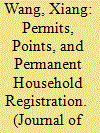

|
|
|
|
|
| Summary/Abstract |
China’s New-type Urbanisation Plan heralded a new phase of reform of the household registration (hukou) system and initiated a nation-wide reconfiguration of hukou policy in Chinese cities. This study reveals that the former localisation of hukou policymaking has been brought to greater uniformity under the current central guidelines. The liberalisation of hukou conversion has been expanded to many large cities that previously employed selective migrant integration policies. Mega-cities have recalibrated the selection criteria for new citizens, elevating the importance of settlement duration and moderating the importance of educational and professional qualifications. Case studies in Guangdong further reveal the dynamic interactions among different levels of government in the course of reform. Local policy experimentations set important precedents for central policymaking, and the central guidelines are enforcing new adjustments in local implementation. The provincial government plays a prominent role in coordinating top-down directives and local conditions.
|
|
|
|
|
|
|
|
|
|
|
|
|
|
|
|
| 8 |
ID:
182982
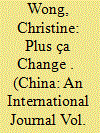

|
|
|
|
|
| Summary/Abstract |
In China's decentralised system, vital public services such as health, education and social welfare are provided by local governments. The intergovernmental fiscal system is critical to ensuring local governments are adequately financed. Since 1994, China has overhauled its public finances to create a system able to finance government operations, support economic growth and fund industrial policies and international initiatives. Its Achilles' heel remains a weak intergovernmental fiscal system that is unable to fund local governments efficiently and equitably. This article analyses local finance through three decades of reform. Despite a promise early in the Xi Jinping administration to realign central–local fiscal relations, local finances have deteriorated since 2015 due to slowing growth, tax cuts and pressures from tightened budget management. Local fiscal difficulties have caused a decline in social spending as a share of gross domestic product. If continued, this trend threatens to reverse recent gains in improving services and undermine other national policy goals.
|
|
|
|
|
|
|
|
|
|
|
|
|
|
|
|
| 9 |
ID:
175562
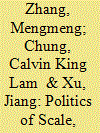

|
|
|
|
|
| Summary/Abstract |
The recent proliferation of China's railways has posed challenges to the dominance of the national-level railway authority on railway development. Since the 2000s, the planning of new railways has evolved into a politics of scale in which actors across multiple scales of government have bargained over railway alignment and station siting for their respective interests. This politics is shaped by the uneven bargaining powers of the contending state agents over railway planning. Interscalar division of regulatory oversight over strategic resources for railway development enables state agents at some scales to bargain more successfully, whereas variations in administrative and economic standing further differentiate the interscalar bargaining powers of municipal governments. Different results of bargaining across scales for each city have produced, as intercity railway planning in the Pearl River Delta illustrates, significant intercity variations in average travel times to the stations for the new railways that these cities share. Owing to the peculiar scalar distribution of the costs and benefits of the new railways, municipal governments with greater bargaining power have, contrary to traditional wisdom, bargained for less accessibility to intercity railway stations.
|
|
|
|
|
|
|
|
|
|
|
|
|
|
|
|
| 10 |
ID:
164411
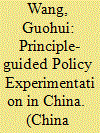

|
|
|
|
|
| Summary/Abstract |
The abolition of Agricultural Tax in 2005 was a major policy of the early Hu–Wen administration. But how and why did it happen? Drawing on abundant media reports, archive documents and internal speeches by key policymakers, as well as on the author's interviews, this article argues that this reform was pushed through (the “how”) by “principle-guided policy experimentation” with origins in the period of Jiang Zemin's leadership. Not only does this show policy continuities from the Jiang–Zhu era into the Hu–Wen period, it also reveals a different process of policy experimentation from that identified by Sebastian Heilmann in the economic policy arena. Under principle-guided policy experimentation, Chinese central decision makers first reached consensus on the principle of the Rural Tax and Fee Reform (RTFR) drawing on policy learning from prior bottom-up local experimentation, and then formulated and implemented an experimental programme from the top-down, funding it in order to encourage local governments to participate. The evidence suggests that international, political (rural instability), economic and fiscal considerations came to explain leaders’ decisions (the “why”) on tax reform as much as their individual preferences.
|
|
|
|
|
|
|
|
|
|
|
|
|
|
|
|
| 11 |
ID:
173251
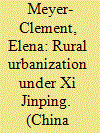

|
|
|
|
|
| Summary/Abstract |
‘Rural community building’ is one of the most prominent policies of rural urbanization and village renovation in China. Since the nationwide implementation of this policy within the scope of the programme ‘Building a new socialist countryside’, the large-scale construction of new residential complexes has accelerated the transformation of the country’s rural landscape. However, extensive demolition and relocation have drawn increasing criticism, and the policy has become synonymous with the seizure of rural land resources by local governments. When Xi Jinping came to power, the new leadership initially appeared to abandon the policy but has eventually revived it. This article studies the implementation and evolution of the rural community building policy as a case of policy learning. The analysis of national and local policy documents and implementation practices in four provinces highlights a new framing of the policy, more intensive hierarchical controls over rural land use, and the state’s increasing reach into village governance, as well as new incentives for local governments to continue with demolition and relocation projects. These changes reveal a mode of policy learning in the context of an authoritarian regime whose goal is to improve policy implementation in the face of growing public criticism and social tension.
|
|
|
|
|
|
|
|
|
|
|
|
|
|
|
|
| 12 |
ID:
184723
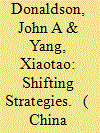

|
|
|
|
|
| Summary/Abstract |
Why do provincial governments change policy, even when those policies have proven successful? This paper explores a debate regarding the determinants of provincial policy choice and the degree of discretion provinces are permitted in this area. It does so by scrutinizing the shift in Guizhou's development policy from a poverty reduction orientation to a wholehearted pursuit of economic growth, urbanization and industrialization. In contrast to those who argue that central experience, prospects for promotion or local conditions are key factors explaining policy choice, the paper concludes that Guizhou's shift in policy had more to do with the backgrounds and experiences of top provincial leaders. The result has implications for our understanding of central–local relations and local government decision making.
|
|
|
|
|
|
|
|
|
|
|
|
|
|
|
|
| 13 |
ID:
142573
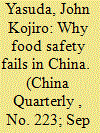

|
|
|
|
|
| Summary/Abstract |
This article examines food safety failures in China to cast light on how scale has deeply affected its regulatory politics. Contrary to studies that view China's food safety challenges as primarily resulting from corruption, local obstructionism or weak state capacity, I argue that China's massive production system, unwieldy bureaucracy, and geographic size pose regulators with a more fundamental policy challenge. As they attempt to build an integrated national regulatory regime, regulators must make difficult trade-offs in cost, policy design and applicability that emphasize the interests of certain stakeholders over others, resulting in a contentious “politics of scale.” The article assesses four failed scale management initiatives: food safety coordination bodies, campaigns, model production zones, and regulatory segmentation. As China transitions to scientifically assessed, risk-based forms of regulation, its pervasive food safety problem suggests the adaptive limits of China's unitary regulatory structure to manage scale and its ensuing politics effectively in a complex multilevel context.
|
|
|
|
|
|
|
|
|
|
|
|
|
|
|
|
|
|
|
|
|